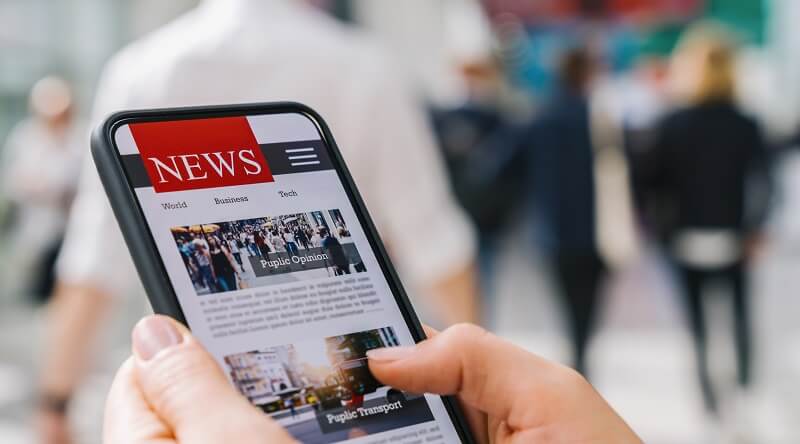The Complete Handbook to Understanding stnews.live in the Digital News Era
Wiki Article
The Value of Fact-Checking worldwide of News Online
The prevalence of false information in today's on-line news landscape has gotten to disconcerting levels. Fact-checking companies play an important role in counteracting this trend. They validate insurance claims and improve the credibility of journalism. The effectiveness of these organizations commonly pivots on their methods and public perception. As audiences navigate this intricate atmosphere, the implications of their searchings for might form the future of news consumption and count on. What does this mean for the integrity of info moving onward?
The Surge of False Information in the Digital Age
Just how has the introduction of electronic innovation added to the spread of misinformation? The rapid development of the net and social media sites systems has actually assisted in the dissemination of details at an unprecedented rate. Users can share posts, video clips, and point of views with a mere click, typically without confirming the content's accuracy. Formulas prioritize spectacular or psychologically billed product, causing a proliferation of misleading narratives that capture focus.Furthermore, the anonymity afforded by electronic platforms permits people to spread incorrect info without accountability (stnews.live). Misinformation grows in resemble chambers, where individuals are exposed primarily to perspectives that enhance their ideas, additionally entrenching falsehoods. The saturation of details can bewilder users, making it testing to recognize legitimate resources from unreliable ones. Misinformation has come to be a prevalent issue in the digital landscape, influencing public opinion and count on in legit news sources.
The Duty of Fact-Checking Organizations
Fact-checking organizations play a vital duty in improving the integrity of journalism by validating insurance claims made in news records. Their initiatives are essential in combating false information, making certain that precise info prevails in the electronic landscape. By holding media outlets responsible, these companies add considerably to notified public discussion.Enhancing Reputation in Journalism
While false information proliferates in the digital age, fact-checking organizations play a necessary duty in boosting the reliability of journalism. These organizations thoroughly verify insurance claims made in newspaper article, public statements, and social media sites messages, making certain that details distributed to the public is precise and reliable. By giving independent assessments, they work as an essential source for journalists, helping them preserve high standards of honesty. Furthermore, their initiatives advertise transparency in media, cultivating public depend on. As target markets become increasingly discerning, the existence of respectable fact-checking entities can differentiate reputable news resources from those that may spread out falsehoods. Inevitably, the dedication of fact-checking organizations to support truthfulness is important for the health and wellness of autonomous discourse.Combating False Information Properly
As misinformation proceeds to spread swiftly throughout digital platforms, the function of fact-checking organizations becomes significantly critical in the battle for accurate details. These organizations act as guard dogs, inspecting cases made by public figures and media outlets to ensure liability. By employing extensive study approaches and professional analysis, they verify truths and clear up misleading stories. Their findings are disseminated via various channels, informing the public and promoting vital thinking. Furthermore, partnerships with social media sites systems boost their reach, enabling prompt flagging of incorrect information. As digital proficiency grows, the impact of fact-checking organizations is important in equipping audiences to recognize reality from falsehood, ultimately adding to a much more informed culture.Just How Misinformation Affects Public Assumption
False information significantly weakens depend on in media, leading audiences to doubt the trustworthiness of news sources. Therefore, individuals typically move in the direction of outlets that enhance their current beliefs, contributing to the polarization of opinions. This vibrant develops a fragmented info landscape, where shared recognizing becomes progressively challenging to achieve.Count on Media

Rely on media has actually come to be significantly fragile in the digital age, where the rapid spread of false info can skew public understanding. As misinformation proliferates across social networks and online platforms, target markets often discover it challenging to recognize legitimate sources from unstable ones. This unpredictability fosters uncertainty, leading many people to examine the intentions behind news reporting. Consequently, count on established media outlets has reduced, as customers significantly transform to alternative sources that might lack strenuous content standards. This erosion of trust not only influences private ideas yet likewise threatens the cumulative ability to take part in informed conversations. Ultimately, the honesty of journalism goes to risk, highlighting the essential demand for efficient fact-checking to bring back confidence in the media landscape.

Polarization of Point of views
The increasing hesitation toward standard media has actually added to a growing polarization of opinions amongst the general public. False information, typically distributed through social networks and on the internet systems, plays a substantial duty in shaping unique ideological separates. Individuals often choose info that aligns with their pre-existing ideas, strengthening their viewpoints while rejecting opposing viewpoints. This resemble chamber result magnifies divisions, bring about go to this web-site a fragmented public discussion where consensus comes to be progressively elusive. Furthermore, sensationalized narratives flourish in this setting, better skewing public understanding and cultivating distrust in legitimate sources. As polarization intensifies, the need for effective fact-checking comes to be paramount to link voids and advertise educated conversations, inevitably ensuring a much more natural society capable of steering complex problems.Strategies for Efficient Fact-Checking
Efficient fact-checking depends on a methodical method that consists of comprehensive research, verification of sources, and vital evaluation of insurance claims. A fundamental technique is cross-referencing information from numerous reliable resources to verify its precision. Fact-checkers frequently use specialized databases and archives to trace the beginning of particular declarations, guaranteeing that the reported information straightens with recorded proof.An additional important approach entails scrutinizing the context in which cases exist. Misleading details can arise from out-of-context quotations or careful information use. By analyzing the wider narrative, fact-checkers can identify prospective biases or false impressions.
Furthermore, involving with experts in appropriate areas can supply quality and understanding that improves the fact-checking procedure. This partnership can reveal nuances that laypeople may neglect - stnews.live. Ultimately, a self-displined approach combining these methods cultivates a much more informed public, improving the reliability of info distributed in the electronic age
The Impact of Social Network on News Intake
Exactly how has social media changed the way individuals take in news? The development of systems like Facebook, Twitter, and Instagram has notably transformed news intake patterns. News is currently shared quickly, allowing users to accessibility real-time updates and involve with web content via likes, shares, and remarks. This immediacy has actually promoted a choice for bite-sized information, typically at the expense of thorough evaluation.Social media makes it possible for personalized news feeds, where algorithms curate web content based on user preferences, creating resemble chambers that might restrict direct exposure to varied point of views. The role of typical news electrical outlets has actually decreased as individuals significantly rely upon peer recommendations and trending topics. The reputation of details is typically compromised, as sensationalism can eclipse valid coverage. In general, social media sites has reshaped news consumption, emphasizing speed and personalization while testing the requirements of journalistic honesty.
Encouraging Target Markets to Identify Reputable Resources

Furthermore, taking a look at the authorship and organizational history of news posts can expose potential biases. Cross-referencing information across multiple reputable electrical outlets even more enhances the verification process. Making use of digital devices, such as web browser extensions that rate the reputation of web sites, can additionally assist in determining trustworthy information. By proactively involving with these resources and growing a critical attitude, target markets i was reading this can much better outfit themselves to determine trusted news sources, ultimately fostering a more informed culture amidst the intricacies of today's media setting.
The Future of Journalism and Fact-Checking
As the media landscape evolves, the future of journalism and fact-checking faces both challenges and chances. The surge of digital systems has actually democratized information dissemination, allowing varied voices to emerge. Nonetheless, this has actually likewise resulted in the proliferation of misinformation, demanding durable fact-checking devices. Journalists will increasingly depend on modern technology, including AI tools, to verify realities rapidly and effectively.Partnership in between wire service and fact-checking entities is anticipated to enhance credibility and openness. Target market involvement will certainly play a try here necessary function, as educated readers end up being considerable companions in identifying credible content.
The need for liability and accuracy is likely to grow, pressing journalists to support high requirements in their coverage. Eventually, the future of journalism may rest on its ability to adjust to technological innovations while maintaining journalistic integrity, making sure that fact-checking continues to be a cornerstone of reputable news.
Often Asked Concerns
How Can I Report Misinformation I Run Into Online?
To report false information experienced online, people can make use of platform-specific coverage devices, give clear evidence, and share the details with fact-checking organizations. Involving with neighborhood conversations can likewise help elevate recognition concerning the misinformation.What Are Usual Indications of False Information in News Articles?
Usual indicators of false information in newspaper article consist of spectacular headlines, lack of trustworthy resources, psychological language, inconsistent realities, and lack of writer qualifications. Readers need to seriously evaluate web content for these indicators to discern precision.How Do Fact-Checkers Verify Sources?
Fact-checkers verify resources by cross-referencing info with reliable databases, consulting professionals, and examining the original context of insurance claims. They also examine the dependability of the sources, guaranteeing precise and trustworthy info for public usage.What Legal Actions Can Be Taken Versus Misinformation?
Legal activities against false information may consist of libel claims, cease-and-desist orders, and governing charges. Victims can prosecute with civil courts, while some territories impose penalties or permissions on platforms sharing incorrect details.Exist Apps for Fact-Checking News On-The-Go?
Countless applications exist for fact-checking news on-the-go, including Snopes, FactCheck.org, and PolitiFact. These applications aid users verify insurance claims promptly, promoting informed decision-making and fostering a more critical technique to consuming news in real-time.Report this wiki page